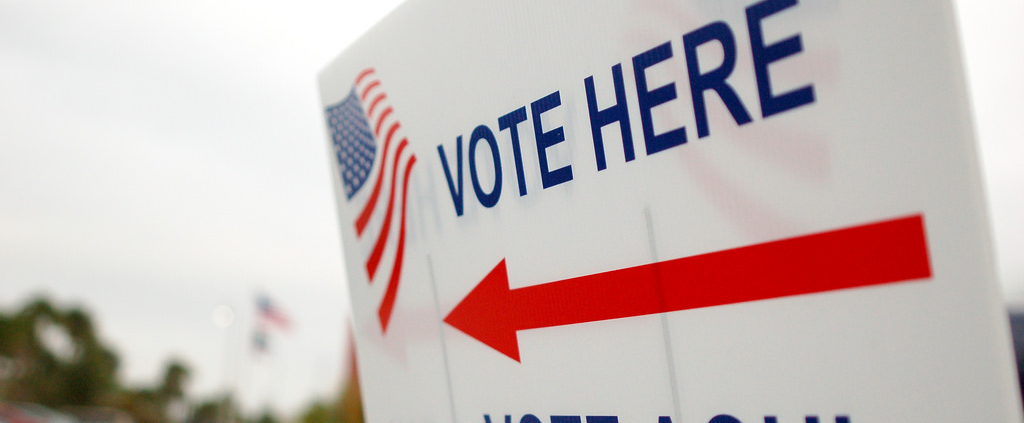The Midterms and Your Organization’s Risk, Tipping the Balance, and PolitiFarce
Here’s What You Need To Know
As election day approaches, the question remains if the country will be overtaken by the blue wave or if the red wall will be big enough to stop it. Regardless of the outcome, however, companies and organizations will need to navigate and influence the post-election environment to their advantage. Here is what you need to know to be prepared to overcome the challenges and make the most of the opportunities after November 6th:
- Will The Red Wall Be Enough To Hold Off The Blue Wave? The Republican National Committee has raised over $270 million for the 2018 cycle, which has been invested in data and turnout infrastructure over the past two years, building on the success of its 2016 operation that helped deliver a surprise victory for Donald Trump. As much as people say this election will be a referendum on the president, Trump has had almost straight-line approval and disapproval since he has entered office, suggesting there is little buyer’s remorse that Democrats can leverage into new votes. Further, the Kavanaugh confirmation galvanized Republican voters and erased any enthusiasm gap once enjoyed by the Democrats. When it comes to the Blue Wave, Democrats have raised a lot of money recently, but it is not being spent in the right places (Texas, anyone?) and may be too late to be effective. That said, Democrats only need 23 seats to gain a majority, and the historical average midterm loss for the president’s party is 25. That loss increases to 37 for presidents whose approval rating is under 50% in the lead up to the midterm election. Given this historical trend, Democrats do not need a wave to win back the House.
- What Should Businesses Expect If Democrats Do Take The House? If Democrats take control, regardless of what they are saying legislative and policy wise, what will overwhelm the leadership’s agenda will be anti-Trump fervor, demanding investigations and impeachment, but the focus and implications of those investigations would reach far beyond the Administration. On a number of key policy issues, companies in industries like energy, pharmaceuticals, financial services, and beyond are at risk of becoming proxies for Trump and his policies. Combine this fervor with the multiple Democratic 2020 presidential contenders in Congress competing for attention and appreciation from their party’s liberal base, and the potential policy and reputational harms for companies and industries multiply significantly. Companies can also expect a Democratic majority to build on the momentum of efforts to coordinate with government officials at the state level.
- Risks From A Blue Wave Extend Well Beyond The Beltway. There are two offices at the state level that the private sector should be watching closely: gubernatorial races with candidates that could be jockeying for the 2020 Democratic nomination, and state attorneys general races with candidates who will likely target corporate interests to elevate their political profiles. While a slew of senators in D.C. are already angling for the nomination and using policy proposals targeting companies, Wall Street, the fossil fuel industry, and others to build support from their base, several gubernatorial candidates could take that approach from their statehouses if they think: “Why not me?” This includes Andrew Cuomo (NY), Gavin Newsom (CA), and Richard Cordray (OH). For attorney general, Keith Ellison in Minnesota and Letitia “Tish” James in New York could build national profiles by suing companies on issues that translate to public support, whether lowering the price of insulin, Wall Street divestment, or New York State’s lawsuit against Exxon Mobil alleging the company deceived shareholders on climate change, which could expand to ensnare other firms and even investor-owned utilities.
- It Is Not Just Who Is On The Ballot, But Also What Is On The Ballot. On November 6th, voters will decide on 157 ballot measures in 37 states across the country, and succeed or fail, these measures provide a predictive model for forthcoming policy battles. The volume of measures is not particularly noteworthy, but what is new and different is what is driving these initiatives: professionalized activists funded by national interest groups or high net-worth individuals, as opposed to local interests that can be held accountable for the consequences of their proposals. With Congress and Trump not enacting the policies national interest groups seek at the federal level, they are working in the states to build momentum and enact policy changes. What should raise companies’ and industries’ interest in these ballot initiatives is that strategies and playbooks in one state will be replicated elsewhere, and those that are successful will be replicated across the country with greater speed.
This highly-politicized environment is the new normal, and organizations and companies should be armed with the information and facts of policy and regulatory issues impacting them to protect their reputations. The more you can influence and shape events in the policy and regulatory landscape to your advantage, the better the chance that you can achieve your organization’s objectives – whatever the outcome of this year’s midterms.
News You Can Use
TIPPING THE BALANCE
Subscribe to Receive Insights
"*" indicates required fields
Amazon has become the latest company to go to a $15 minimum wage, but at the same time workers in D.C. are pushing back. On October 16, the D.C. city council repealed Initiative 77, a measure passed by voters in June that would have raised the minimum wage for all tipped workers by 2026. The initiative, meant to provide financial stability and protections against sexual harassment, was fought by the tipped workers themselves, who argued it would destroy restaurants’ thin profit margins and cut jobs from their support staffs while potentially lowering tipped workers’ take-home pay.
Estimations concluded that Initiative 77 would cost the D.C. restaurant industry $600 million, surge food prices, force restaurants to buy from big box suppliers instead of local farms, and reduce the incentive to leave high tips. An increased minimum wage appears to be a favorable political stance for liberals to take, but when the workers who should be benefitting are fighting back, politicians may want to rethink their positions.
OVERSTEPPING AND OVEREXPOSED
Just as we predicted, receiving investment from sovereign funds of overseas countries brings a myriad of political and reputational risks for companies. This lesson was prominently on display in the scandal surrounding the death of Saudi dissident and journalist Jamal Khashoggi. After repeated denial, the Saudi government admitted that Khashoggi was murdered in its consulate right before Saudi Arabia’s Future Investment Initiative Conference, also known as “Davos in the Desert.”
American businesses, media outlets, and U.S. Treasury Secretary Steven Mnuchin pulled out of the conference in response, although the political and reputational risk has already impacted their future exposure to the Kingdom. Going forward, executives need to accept their roles as “de facto diplomats ” in today’s era of elevated risk, and evaluate their organization’s business decisions through this lens in order to avoid negative implications that may stem from it.
CLIMATE COVER THANKS TO TREES?
The UN’s Intergovernmental Panel on Climate Change recently put out a report on climate change, and panic ensued given its bleak predictions. Abigail Swann, a professor at the University of Washington, however published research that could change the way scientists view climate change. While most research on climate models focuses on wind, rain, and other physical occurrences, Swann believes researchers have ignored vegetation and how plants influence rainfall, a role that “blows the ecology community’s mind.” Forests provide carbon storage, water filtration, and wildlife habitat, and the total effect it can have on the ecosystem is largely ignored in gloom and doom studies.
Ironically, Swann’s research also finds that forest die-offs can be beneficial to the climate in certain areas, suggesting that environmentalist efforts to plant trees may do more harm than good to the climate in some cases. While there is uncertainty in how these findings can be implemented, it serves as a reminder that the earth remains incomprehensible to experts and predictions are futile, meaning balanced, responsible solutions are always a better approach than panic.
POLITIFARCE?
For the second time in a week, PolitiFact, a media fact-checker, has been caught not checking its own facts. The site originally ruled that a claim that Sen. Claire McCaskill (D-MO) said “normal people” can afford private planes was “false,” even though a video of McCaskill saying exactly that in a town hall is readily available on the Internet. PolitiFact only changed its ruling after receiving backlash for its favoritism.
Whether it was bias or sloppiness or both, these latest incidents make it more difficult for fact checkers to be seen as impartial referees instead of engaged combatants in the political clashes of our era.



